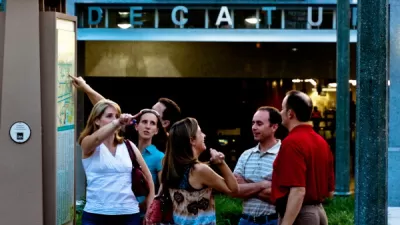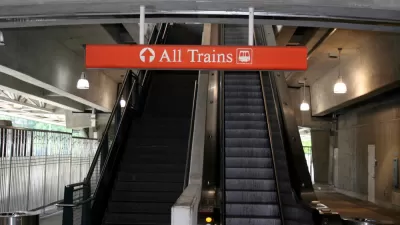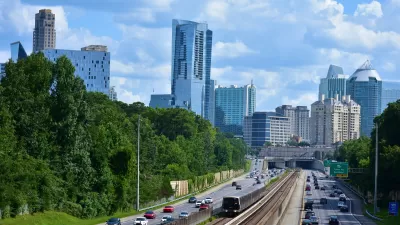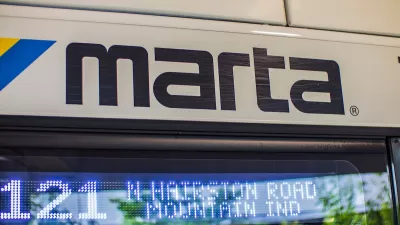The results of a new poll conducted for The Atlanta Journal-Constitution show that even in a notoriously sprawling metro (and perhaps more so), transit riders have a stronger connection to their neighborhoods and the larger region.

A poll conducted by SRBI of residents in 10 Georgia counties has found that 51 percent of those who'd ridden Atlanta's transit service (MARTA) at least once in the past six months said they had a strong connection to the Atlanta region, versus 23 percent of nonriders. "In addition, 72 percent of riders had a strong connection to their neighborhood versus 64 percent of nonriders. A total of 64 percent of transit riders felt a strong connection to the county where they reside, as opposed to 55 percent of nonriders," report Craig Schneider and Steve Visser.
"The poll results raise provocative questions as to the value of the transit service beyond getting tens of thousands of people to work each day. Do people have a deeper connection to community because they ride transit? Or do they ride transit because they already have that deeper connection?" According to the authors, "Experts said there’s little research on whether or transit riders feel more connected to their communities."
"Jana Lynott, a transportation analyst for the American Association of Retired Persons, said many people who take transit have an 'urbanist' point of view, meaning they already view themselves as tightly bound up in the region’s social fabric."
"Traveling the transit lines can enhance a rider’s appreciation for their surroundings, said Cynthia Hewitt, an associate professor of sociology at Morehouse College. 'You interact and share space with more people, and that makes you feel a part of the community,' she said."
FULL STORY: Poll: MARTA riders have stronger connection than nonriders to Atlanta region

Maui's Vacation Rental Debate Turns Ugly
Verbal attacks, misinformation campaigns and fistfights plague a high-stakes debate to convert thousands of vacation rentals into long-term housing.

Planetizen Federal Action Tracker
A weekly monitor of how Trump’s orders and actions are impacting planners and planning in America.

Chicago’s Ghost Rails
Just beneath the surface of the modern city lie the remnants of its expansive early 20th-century streetcar system.

Bend, Oregon Zoning Reforms Prioritize Small-Scale Housing
The city altered its zoning code to allow multi-family housing and eliminated parking mandates citywide.

Amtrak Cutting Jobs, Funding to High-Speed Rail
The agency plans to cut 10 percent of its workforce and has confirmed it will not fund new high-speed rail projects.

LA Denies Basic Services to Unhoused Residents
The city has repeatedly failed to respond to requests for trash pickup at encampment sites, and eliminated a program that provided mobile showers and toilets.
Urban Design for Planners 1: Software Tools
This six-course series explores essential urban design concepts using open source software and equips planners with the tools they need to participate fully in the urban design process.
Planning for Universal Design
Learn the tools for implementing Universal Design in planning regulations.
planning NEXT
Appalachian Highlands Housing Partners
Mpact (founded as Rail~Volution)
City of Camden Redevelopment Agency
City of Astoria
City of Portland
City of Laramie





























